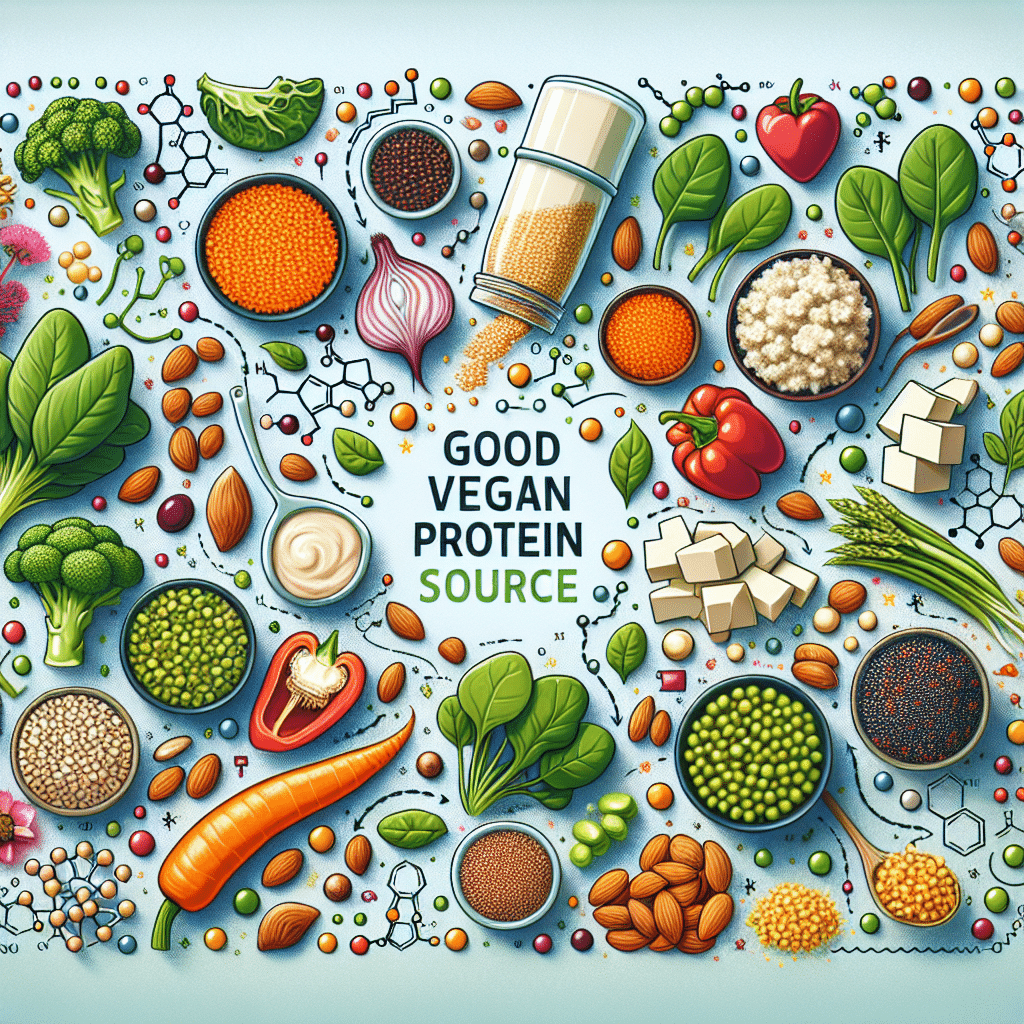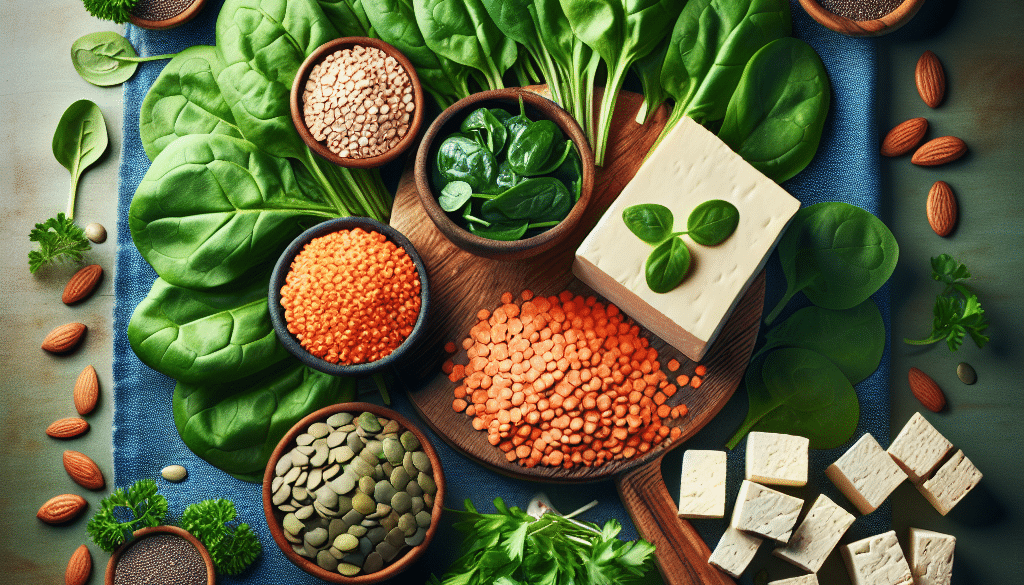What Is A Good Vegan Protein?
-
Table of Contents
- Vegan Protein Sources: The Best Options for Plant-Based Diets
- Understanding Vegan Protein Quality
- Top Vegan Protein Sources
- Legumes: A Staple in Vegan Protein
- Nuts and Seeds: Nutrient-Dense Protein Snacks
- Whole Grains: More Than Just Carbs
- Soy Products: Versatile and Protein-Rich
- Seitan: The Wheat-Based Meat Alternative
- Plant-Based Protein Powders: A Convenient Boost
- Combining Vegan Proteins for Complete Nutrition
- Case Studies and Statistics
- Conclusion: Embracing Variety for Protein Sufficiency
- ETprotein: Your Source for High-Quality Vegan Proteins
Vegan Protein Sources: The Best Options for Plant-Based Diets

Protein is a crucial macronutrient that plays a vital role in building muscle, repairing tissue, and producing enzymes and hormones. While animal products are well-known sources of protein, the vegan diet excludes these, leading many to wonder where to find good vegan protein sources. This article explores the best plant-based proteins that can support a healthy and balanced vegan diet.
Understanding Vegan Protein Quality
Proteins are made up of amino acids, some of which are essential because the body cannot produce them. A “complete protein” contains all nine essential amino acids in sufficient quantities. While many plant-based proteins are not complete on their own, combining different plant sources can provide all the essential amino acids needed.
Top Vegan Protein Sources
Here are some of the most nutritious and protein-rich vegan foods:
- Legumes: Beans, lentils, chickpeas, and peas are excellent sources of protein and fiber.
- Nuts and Seeds: Almonds, walnuts, flaxseeds, chia seeds, and hemp seeds are not only high in protein but also contain healthy fats.
- Whole Grains: Quinoa, buckwheat, and amaranth are complete proteins and offer a good amount of fiber.
- Soy Products: Tofu, tempeh, and edamame are complete proteins and versatile ingredients in various dishes.
- Seitan: Also known as wheat meat, seitan is a high-protein meat substitute made from gluten.
- Plant-Based Protein Powders: These can be derived from sources like pea, rice, hemp, or mixed plant proteins.
Legumes: A Staple in Vegan Protein
Legumes are a cornerstone of vegan protein intake. For example, lentils provide about 18 grams of protein per cooked cup, making them a powerhouse for plant-based diets. They are also rich in other nutrients like iron, fiber, and folate.
Nuts and Seeds: Nutrient-Dense Protein Snacks
Nuts and seeds are more than just snacks; they are mini-nutrient bombs. Almonds, for instance, offer around 6 grams of protein per ounce, along with heart-healthy fats, vitamin E, and magnesium.
Whole Grains: More Than Just Carbs
Whole grains are often seen as carbohydrate sources, but some, like quinoa, are also complete proteins. A cup of cooked quinoa provides about 8 grams of protein, along with all nine essential amino acids.
Soy Products: Versatile and Protein-Rich
Soy products are some of the most versatile and protein-rich foods in a vegan diet. Tofu can contain up to 20 grams of protein per half-cup serving, depending on its firmness. It’s also a great source of calcium and iron.
Seitan: The Wheat-Based Meat Alternative
Seitan is a popular protein source for many vegans due to its meat-like texture and high protein content, with about 25 grams of protein per 3.5 ounces. It’s also low in carbohydrates and fats.
Plant-Based Protein Powders: A Convenient Boost
For those needing a convenient protein boost, plant-based protein powders can be an excellent option. They can be added to smoothies, oatmeal, or baked goods to increase protein intake without much effort.
Combining Vegan Proteins for Complete Nutrition
It’s important for vegans to combine different protein sources to ensure they’re getting all essential amino acids. For example, rice and beans eaten together can provide a complete protein profile.
Case Studies and Statistics
Research has shown that a well-planned vegan diet can provide all the necessary nutrients, including protein. A study published in the Journal of the Academy of Nutrition and Dietetics found that vegan diets typically meet or exceed recommended protein intakes when caloric intakes are adequate.
Conclusion: Embracing Variety for Protein Sufficiency
In conclusion, a variety of plant-based foods can provide high-quality protein for vegans. By incorporating legumes, nuts, seeds, whole grains, soy products, seitan, and plant-based protein powders into their diets, vegans can meet their protein needs. It’s all about variety and ensuring a mix of different protein sources to get a complete amino acid profile.
ETprotein: Your Source for High-Quality Vegan Proteins
If you’re looking for high-quality vegan protein sources, ETprotein offers a range of organic bulk vegan proteins that cater to various needs. Their products are characterized by a neutral taste, non-GMO, allergen-free attributes, and high purity levels, making them an excellent choice for anyone on a plant-based diet.
About ETprotein:
ETprotein, a reputable protein and L-(+)-Ergothioneine (EGT) Chinese factory manufacturer and supplier, is renowned for producing, stocking, exporting, and delivering the highest quality organic bulk vegan proteins and L-(+)-Ergothioneine. They include Organic rice protein, clear rice protein, pea protein, clear pea protein, watermelon seed protein, pumpkin seed protein, sunflower seed protein, mung bean protein, peanut protein, and L-(+)-Ergothioneine EGT Pharmaceutical grade, L-(+)-Ergothioneine EGT food grade, L-(+)-Ergothioneine EGT cosmetic grade, L-(+)-Ergothioneine EGT reference grade and L-(+)-Ergothioneine EGT standard. Their offerings, characterized by a neutral taste, non-GMO, allergen-free attributes, with L-(+)-Ergothioneine purity over 98%, 99%, cater to a diverse range of industries. They serve nutraceutical, pharmaceutical, cosmeceutical, veterinary, as well as food and beverage finished product distributors, traders, and manufacturers across Europe, USA, Canada, Australia, Thailand, Japan, Korea, Brazil, and Chile, among others.
ETprotein specialization includes exporting and delivering tailor-made protein powder and finished nutritional supplements. Their extensive product range covers sectors like Food and Beverage, Sports Nutrition, Weight Management, Dietary Supplements, Health and Wellness Products, and Infant Formula, ensuring comprehensive solutions to meet all your protein needs.
As a trusted company by leading global food and beverage brands and Fortune 500 companies, ETprotein reinforces China’s reputation in the global arena. For more information or to sample their products, please contact them and email sales(at)ETprotein.com today.














